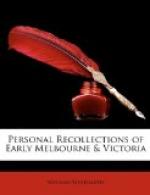I had much to do with Fawkner, especially after he and I met in our young colony’s first Legislature, and after I sufficiently knew him, so as to allow for the rough exterior of his nature, I never had but one opinion of the man. That opinion was, that throughout every condition of the considerable space of his later life, whether in health or sickness, strength or weakness, prosperity or adversity—for, at first at least, he, like many others, was not prosperous in golden-fleeced and golden Victoria—he toiled, late and early, for what, in his honest judgment, was for the good of his colony; and with a singleness of purpose which was not excelled—was not, I think, equalled, to my knowledge at least—by any other in that colony.
He seemed to make an ascent under the exhilarating circumstances of his new and increasingly responsible position, and to have the consciousness of a great mission, which nerved him to surmount all that was dubious in his earlier career. Nor was he behind in less pretentious ways. I never once heard of any mean or over-reaching act of his, even in the smallest matters. He once told me, in his prosperous days, with much becoming feeling, and as an incident he could never forget, that when quite broken in fortune, he had received, as unasked as unexpected, a most timely pecuniary help from Mr. Henry Moor, the well-known solicitor. The two were, I think, at hearty variance across the political hedge; the more honour to both.
We have seen that he showed pluck in his earlier life, even in bad associations; and he displayed the same under better auspices later on. His action with a certain gravely suspected Commissioner of Crown Lands was a good illustration. This high functionary, who, in those pre-constitutional times, was practically an irresponsible Caesar over a vast estate of dependent Crown tenants, whose interests might in any case be seriously jeopardized by any unfairness, and who, therefore, like the wife of his prototype, should be even above suspicion, was accused by rumours, of no slight noise or breadth, of unfaithfulness to his charge, and in the grossest and most mercenary of forms. Even with the clearest case it was anything but assuring




